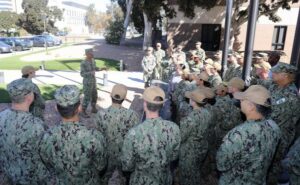
Story by Arsenio R. Cortez Jr.
Naval Medical Forces Pacific
Naval Medical Forces Pacific (NMFP) conducted a Command Post Exercise (CPX) at Naval Medical Center San Diego, October 29-31, as part of Exercise Keen Sword 25, highlighting Navy Medicine’s readiness and expeditionary medical capabilities.
Keen Sword is a biennial, joint and bilateral field-training exercise involving U.S. military and Japan Self-Defense Forces (JSDF) personnel, designed to increase readiness and interoperability while strengthening the U.S.-Japan alliance.
The CPX served to ensure that NMFP’s deployable Task Group headquarters maintains key skill sets and remains prepared to support Commander, U.S. Pacific Fleet (COMPACFLT) in regional operations.
“Our objective is to confirm our readiness to support COMPACFLT and the joint force with essential Health Service Support (HSS) functions and establish conditions for future operations,” said Cmdr. Noah Apusen, deputy director of NMFP’s Maritime Operations Center.
The CPX tested the team’s ability to coordinate medical operations under austere conditions, replicating the challenges of a contested environment. It simulated coordinated efforts to sustain the joint force through command and control (C2), medical logistics, patient movement, and force health protection, bringing together personnel from NMFP, Navy Medicine Readiness and Training Command (NMRTC) San Diego, NMRTC Yokosuka, NMRTC Guam, NMRTC Camp Pendleton, and elements of Expeditionary Medical Facility (EMF) Alpha and the reserve component EMF Camp Pendleton.
Months of planning, working groups, and “road-to-crisis” briefings contributed to the team’s success, despite challenges, including managing high operational tempo with limited communication, Apusen explained.
“Our team met the training objectives, demonstrating command and control, establishing Role 3 hospitalization, moving critical supplies, and coordinating multi-modal patient movement,” Apusen said. “This exercise builds our ‘bench’ by acclimating new Task Group members to their responsibilities, from medical logistics to battle watch and patient movement.”
The CPX also underscored the support provided to medical units supporting the warfighters, like the Expeditionary Medical Facility (EMF) 150-Bravo, which concurrently conducted field training alongside the JSDF at Camp Foster, Okinawa, Japan, from Oct. 23 to Nov. 1. The exercise demonstrated EMF Bravo’s capacity to integrate with JSDF counterparts in mass casualty scenarios, refining Role 2 to Role 3 casualty evacuation procedures, multi-service ward bed expansion, and walking blood bank activation.
Rear Adm. Guido Valdes, commander of NMFP, emphasized the value of these exercises in enhancing the responsiveness of Navy Medicine.
“Exercises like the CPX and EMF Bravo’s field training with the Japan Self-Defense Forces exemplify the power of collaboration and preparation,” Valdes said. These scenarios reinforce our ability to provide timely, life-saving medical support under any conditions, which is vital to maintaining the readiness of our warfighters.”
Naval Medical Forces Pacific (NMFP) provides oversight for 10 Navy Medicine Readiness and Training Commands (NMRTC), on the West Coast and Pacific Rim that train, man, and equip medical forces, primarily in military treatment facilities. Globally, NMFP oversees eight research laboratories that deliver research expertise in support of warfighter health and readiness. Additionally, NMFP manages the Naval Expeditionary Medicine Warfighter Development Center (NEMWDC), which plays a critical role in preparing medical teams for expeditionary and operational environments.